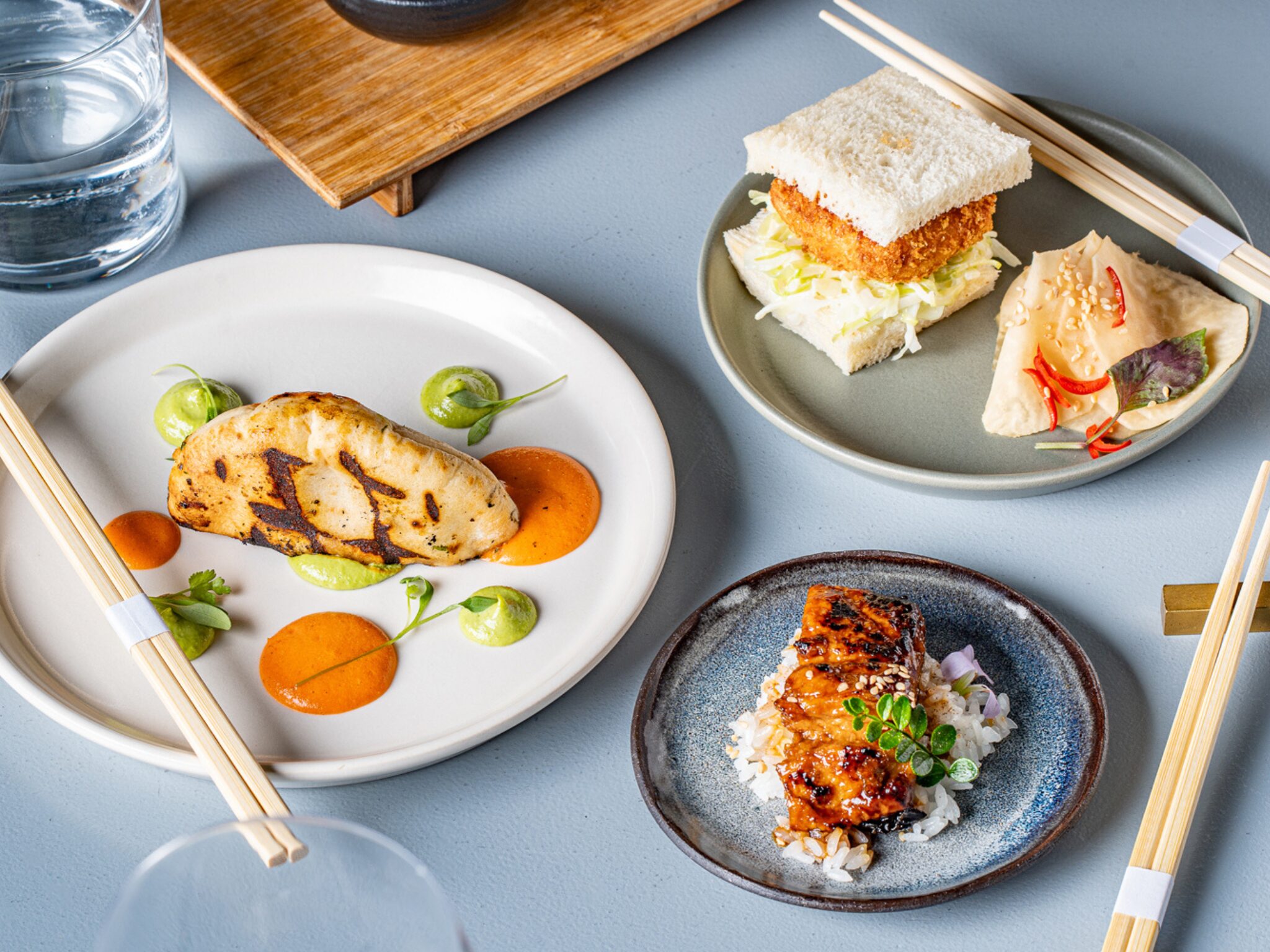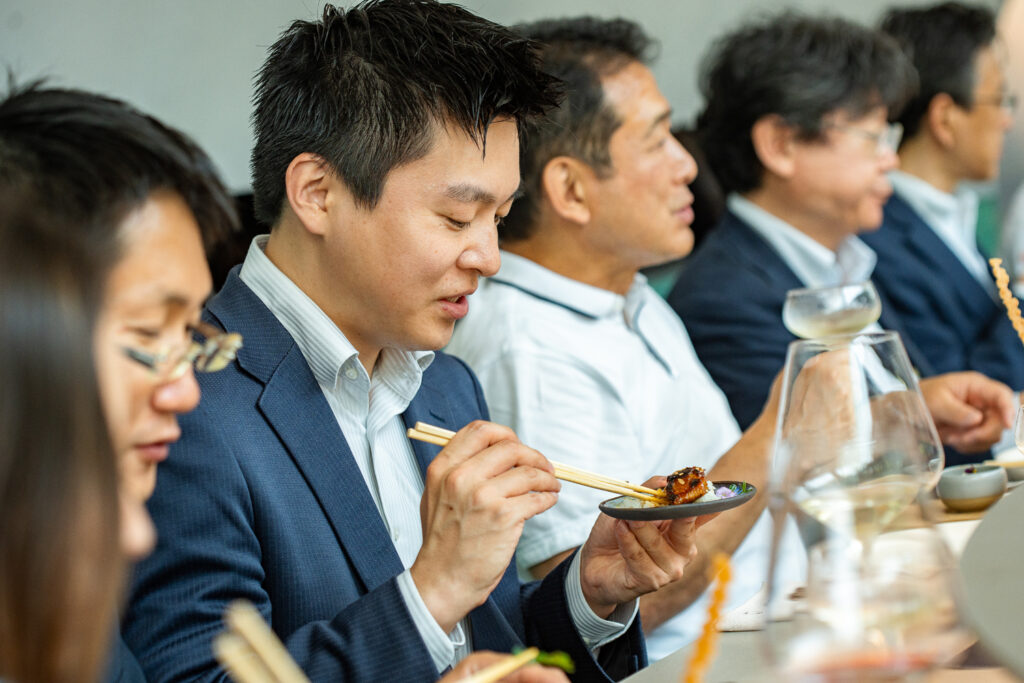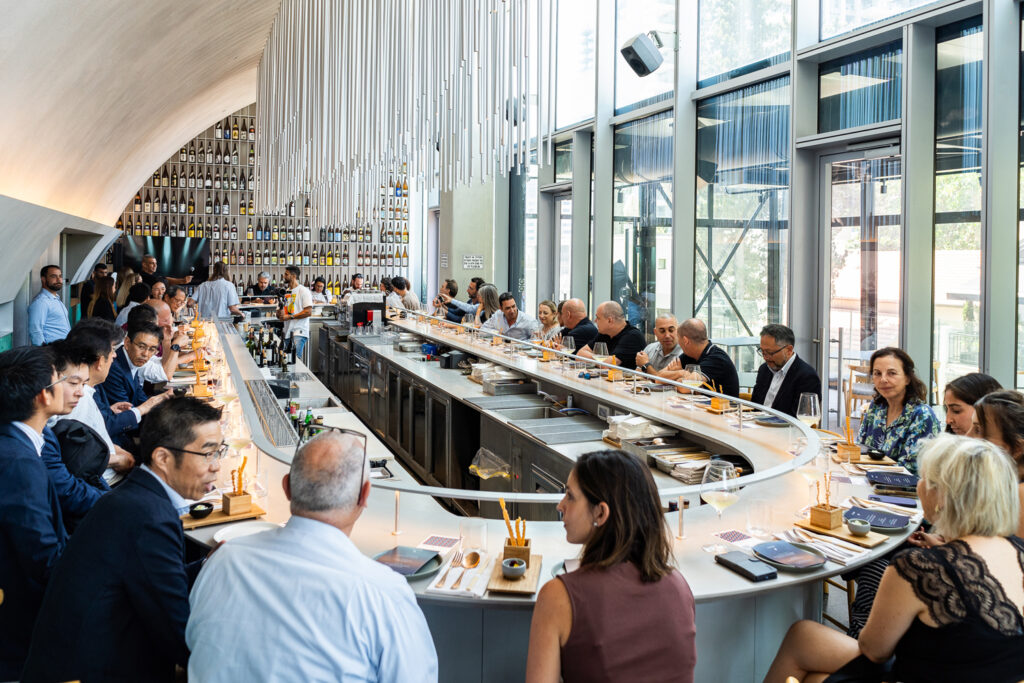
Israeli alternative protein startup Forsea Foods held an intimate tasting event for its cultivated unagi in Tel Aviv, with plans to launch the eel meat in Japan by 2026.
Investors, journalists, food manufacturers, opinion leaders and government representatives all convened at A, the Japanese restaurant in Tel Aviv, to get a taste of cultivated unagi yesterday.
The event, hosted by Forsea Foods, showcased three dishes featuring the Israeli startup’s cultivated freshwater eel as a centrepiece, nearly five months after it debuted the first prototype of the seafood innovation.
The highlight of the menu was unagi kabayaki, a traditional Japanese dish featuring a grilled eel fillet on a bed of rice. The preparation of the eel was supported by Yuval Ben Neriah, head chef and owner of A, and Katsumi Kusumoto, owner of Tokyo vegan restaurant Saido. It was an extension of the latter’s collaboration with Forsea Foods, having created two unagi dishes as proof of concept back in January.
“This project with Forsea has been particularly exciting as it marks my first venture into future food and the world of cell-cultured seafood and its resonating sustainability message,” said Ben Neriah. “The feedback from the diners was indeed uplifting. Several remarked that they wouldn’t have guessed that the unagi was cell-cultivated had they not been informed.”
Now, the company plans to hold further tasting events outside Israel this year, in preparation for regulatory applications and a market launch slated for 2026.

Hybrid seafood tasting pinpoints the cost challenge
Forsea Foods’ patented method for cultivated seafood uses organoid technology to create 3D microtissues comprising fat, muscle and connective tissues, which can mimic the functions and structure of organs. These spontaneously differentiate into edible cells, replicating the natural process of cell formation.
Moreover, the cell lines can self-organise into tissue structures without scaffold support. This simplifies the production process, eases supply chain bottlenecks for eel meat, and enhances the potential for scalability. And by significantly reducing the reliance on growth factors, the startup can produce in an efficient and cost-effective manner.
A $4.3B market, eel has always been a luxury seafood product, commanding wholesale prices between $40 and $60 per kg in Japan (which consumes over 70% of all eel catch). But overfishing, poaching, illegal trading, breeding troubles and pollution have ravaged supplies of the fish, with consumption declining from about 160,000 tonnes in 2000 to just over 60,000 tonnes in 2021 in Japan.
All this has made eel a critically endangered species and likely to become more expensive as demand doesn’t seem to be slowing down. Tackling costs is crucial, and it’s something that has been a major challenge for cultivated meat companies ever since the advent of the technology.
This is why most cultivated meat products that have come to the market or been showcased in public tastings are actually hybrids of plant-based ingredients and cultivated cells, which helps lower costs and makes them commercially viable. The eel presented in Forsea Foods’ tasting also contained plants, revealed co-founder and CEO Roee Nir.
While he didn’t disclose the amount of eel cell biomass used, he told Green Queen that “it was very evident in the tasting experience”. But Forsea Foods, which is working to scale up its process now, is confident about the price equation, with Nir suggesting that its technology will allow it to bring costs below price parity once it reaches larger production levels.

“The current R&D cost of the dishes we served is not really relevant to the price of the future product,” he argued. “Our organoid technology has several remarkable advantages related to the price parity challenge – it reduces the use of growth factors, eliminates the need for the scaffolding stage and makes the production process much more scalable.”
He added: “Forsea’s unique organoid technology has the potential to overcome many of the industry bottlenecks in bringing cultivated meat to the consumer plate… This event was a great opportunity for us to present our unprecedented achievements to partners and industry stakeholders.”
Forsea Foods hopes to debut cultivated unagi in Japan by 2026
One of the 40 attendees of Forsea Foods’ tasting event was Takahashi Seiichiro, Japan’s deputy chief of mission to Israel. It’s a marker of the startup’s commercialisation plans, targeting the main consumer of eel meet globally. “While we Japanese have been eating eel for more than 5000 years, we understand that cultivating eel is no simple task. Therefore, I believe that introducing the first cell-cultured eel is the accomplished result of great comprehensive corporate efforts,” said Seiichiro.
Forsea Foods is developing relationships with strategic partnerships in Japan as it targets a commercial debut of its cultivated eel in 2026. Saido – which already serves a vegan version of the fish – has previously indicated its intention to offer cultivated unagi once regulatory approval comes through. The startup previously told Green Queen it’s in talks with food safety authorities in Singapore too, but Nir said the plan is to introduce its product in Japan first, since it’s a “far larger” market.
Japan is among the countries advancing regulatory progress for novel foods. In April, the Ministry of Health, Labour and Welfare (which will continue to oversee food safety) transferred its food hygiene standards division to the Consumer Affairs Agency. Companies now must liaise with two agencies on regulatory conversations, but this puts the ultimate responsibility in prime minister Fumio Kishida’s hands.
“The Japanese regulatory process establishment is being drafted these days. That takes time. However, there is a strong backwind from the government to promote this industry,” Nir said, pointing to Kishida’s comments last year that called cellular agriculture an important part of “realising a sustainable food supply”. “Our assumption is that cultivated meat will be approved, if not late 2025, in early 2026,” he added.

Looking forward, the company is now working to enhance its recipes. Since the start of the year, we made significant advancements in improving our cell lines,” said Nir, who added that Forsea Foods is working on six different cell lines.
The startup, which has so far raised $5.2M in seed financing, will soon launch its Series A funding round, with plans to use the capital to establish a commercial pilot plant (the location of which is yet to be decided). It’s a tough funding environment for cultivated meat, where investments declined by 78% in 2023.
“Investors are now more selective and looking for companies with technological and commercial advantages. Forsea has a very unique organoid technology that allows it to reach price parity faster and bring its product to the consumer’s plate,” said Nir. “In addition, the company’s focus species at risk, which have a high price point and large market potential, allow it to target a very attractive market. Our first product, the cultivated eel, is very attractive in the Asian, European and American markets.”
Forsea Foods is the only known company working on cultivated eel, but others are producing plant-based versions. Fellow Israeli startup Steakholder Foods showcased a 3D-printed alternative in December (it plans to include cultured eel cells in the product at a later stage, if costs allow). Meanwhile, New York’s Ocean Hugger Foods and Japanese giant Nissin already have vegan eels on the market (using aubergines and soy protein, respectively).
The post Forsea Foods Hosts Cultivated Eel Tasting in Israel, Aims for 2026 Rollout appeared first on Green Queen.
This post was originally published on Green Queen.